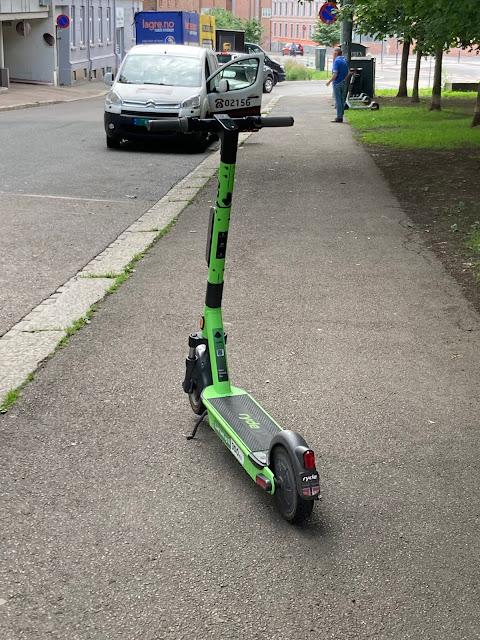I have very little good to say about electric scooters, which is perhaps a bit sad given that they seem to be a rather congenial way of getting around a town or city. My dislike of them stems from the fact that Oslo has done a terrible job of regulating their use. You can read about the scooters and why they are so unpopular at present with just about everyone in Oslo except the halfwits who use/abuse them and the privilege of driving them: More rules loom for electric scooters (newsinenglish.no)
New regulations regarding their use are forthcoming in August; they can't come too soon, because at present, navigating your way as a pedestrian on Oslo's sidewalks (where many of these scooters are driven) is like walking out onto a crowded highway with cars speeding past you on all sides. You risk your life, and at the very least, you risk major injury. There are a number of pedestrians who have been injured by them already. As I wrote on my Facebook page last night:
I fully support these new rules, because the halfwits who cause the chaos described in the article are a danger to others and to themselves. Additionally, you cannot walk one block in this city now without coming across an electric scooter that is parked smack in the middle of the sidewalk, which is an indication of the appalling lack of respect for others that is rampant in society now. There is absolutely no thought given to the blind, the handicapped, the elderly, mothers with baby carriages, and so on. This is what happens when a city does not regulate such things from the start--a gigantic failure on the part of Oslo's city government.
The halfwits who abuse the privilege of driving them drive too fast, drive on the sidewalks, don't stop at traffic lights, don't stop at pedestrian crosswalks, drive them while drunk, and park them anywhere they like, usually in the middle of the sidewalks for reasons that are unfathomable to me. I am sick and tired of the scooters, and sick and tired of the disrespectful halfwits who drive them. I'm not the only one. But I am going to be more verbal about how I feel as time goes on, especially if the new rules are not enforced. Because that is typical for liberal cities like Oslo where anything goes; they make rules that are not enforced. There are not enough police folk to do all the jobs required of them, and fighting major crime has to be the priority, I understand that. But the blatant lack of respect shown by the el-scooter halfwits is part of the problem in a society that is moving toward chaotic circumstances in many things. If they don't get a grip on this problem, they will have lost the battle for many of the other problems that need dealing with.
The el-scooters should be designated 'motor vehicles', just like motorcycles and mopeds. You cannot ride the latter on a sidewalk. There are rules for driving motorcycles and mopeds. Those rules should be extended immediately to el-scooters.
Another aspect of this problem is that el-scooters run on batteries. The Green Party in Oslo pushes all things electric as environmentally friendly. But electric cars for example are not necessarily more environmentally friendly than cars that run on fossil fuels: Are Electric Cars Really Greener? What About Their Batteries? (youmatter.world). Batteries get used up, and what happens to them? Apparently the el-scooter batteries last about a year. Where do the used-up batteries get dumped? Are they recycled by the companies who produce the el-scooters? I envision this as a major problem for the future. I don't pay much attention to the Green Party here in Oslo because they border on extremist. What I do support is reducing the cost of using public transportation to encourage people to use their cars less. I support neighborhood car-sharing as a way of reducing carbon footprints. There are already companies that exist for this purpose.
The irony is that the young people who slavishly follow the Green Party could be the same people who abuse the el-scooters. It wouldn't surprise me at all. They believe that they are right no matter what, and that they can drive where they want and as fast as they want, when they want. For them, car owners are the real enemy. I feel sure that this is used by them as justification for their reckless attitudes and lack of respect. Because why else would a person who is presumably normal, caring and respectful park an el-scooter in the middle of a sidewalk? Possible answers? These people are not normal, caring or respectful, or they are giving Oslo the finger, pure and simple. Take your pick.






